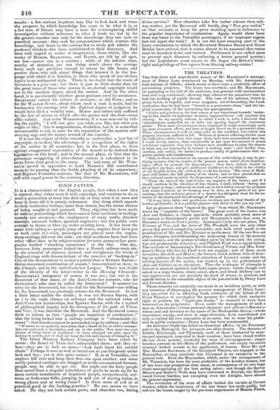IGNIS FATUUS.
4T DI a characteristic of the English people, that when a new idea
• s' started, they either treat it with contempt, and continue to do so ' until a generation at least has died off, or they seize it at once and hunt it down till it is utterly exhausted. Any thing which appeals totheir instinctive feelings, apart from reason, has the better chance .nf being caught at and pursued. Thus, objection has been made .to various proceedings which have caused fatal accidents in trading- vesselt and steamers—the employment of crazy crafts, drunken Aina.sterls, unsound boilers, ignorant engineers; but the public were .contek to drown or blow up under existing laws. It has been the same with railways—people jump off trains engines have been put at both ends of a train, passengers are placed next the engine, steep cuttings fall over the rails ; yet fatal accidents have had little other effect than to be subject-matter for some penny-a-line para- graphs headed "shocking occurrence" or the like. One day, however, forty passengers locked into a French railway-train are, by the remotest of chances, burned, and straightway the whole of England rings with denunciations of the practice of "locking-in." One of the denunciators is no less a person than a SYDNEY SMITH- thrice-renowned combination of sounds ! immortalized at Acre, in the Church, and in the Anti-Corn-law League. There was doubt of the identity of the letter-writer in the Morning Chronicle : BONAPARTE'S antagonist of course it was not ; but was it the Reverend of that name, or the Anti-Corn-law lecturer, who for distinction's sake may be called the Irreverend ? It seemed too witty for the Irreverend, but too dull for the Reverend—too trifling for the Irreverend, too prosingly solemn for the Reverend. At last a little letter settled the doubt ; it was not SiDNEY SMITH, with an i to the main chance on railways and the national value of Anti-Corn-law lectureships, but SyDNEY SMITH, with the Y typical of philosophical inquiry and the divergence of the path of Virtue and Vice: it was therefore the Reverend. And the Reverend comes forth to inform us that "people are impatient of combustion ;" that the being locked into a railway-carriage is "abominable ty- ranny"; that females cannot be persuaded to go by railway ; and that "It seems to me perfectly monstrous that a hoard of ten or twelve monopo- lists can read such a description, and say to the public, 'You must run your chance of being burnt or mutilated: we have arranged our plan upon the locking-in system, and we shall not incur the risk and expense of changing it." The Great Western Railway Company have been taken by storm : the Board of Trade have admonished them ; and they re- lent—they are to lock no more—"Lok bath burst his tenfold chain." Perhaps it were as well or better not to put live goods under lock and key ; yet is this quite certain ? If, as at Versailles, two engines fall over and heap their fires one upon another, and some newly-painted carriages are dragged on to the accumulated furnace, people may be able to get out. But might not the forty people thus saved from a singular coincidence of perils be made up for by more certain instalments of impatient people, inexperienced, ner- vous, or frolicsome folks, jumping in and out of moving trains, in wrong places and at wrong times ? Is there more of evil or of practical good in the locking practice ? No one seems to have asked. Do they not lock certain pews, and churches too, during divine service ? Now churches take fire rather oftener than rail- way-trains; yet the Reverend will hardly sing " Non pew andrai" on that account, or keep his pews standing open in deference to the popular impatience of combustion. Again, would there have been any harm to the Versailles passengers, if an improper engine had not upset the train ? It is not the least amusing part of the hasty conclusions to which the Reverend SYDNEY SMITH and Great Britain have arrived, that it seems almost to be assumed that trains must be knocked down and burned. Parliament is not called upon to prevent such disasters by enforcing a better general system; but the Legislature must secure to the lieges the Briton's birth- right and privilege of free egress from blazing railway-trains !


























 Previous page
Previous page